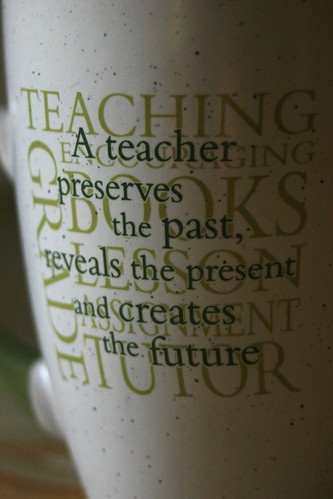 Recently I stumbled upon a blog post by Will Richardson talking about professional development for teachers, specifically in the area of technology. In the subsequent comments under the post the discussion between David Warlick and a few others took an interesting turn from professional development to whether or not teaching iteself is a profession. David posted additional thoughts on his own blog:
Recently I stumbled upon a blog post by Will Richardson talking about professional development for teachers, specifically in the area of technology. In the subsequent comments under the post the discussion between David Warlick and a few others took an interesting turn from professional development to whether or not teaching iteself is a profession. David posted additional thoughts on his own blog:
If you think of teaching as something you do in one room, beside the room of another teacher, beside the room of another teacher, delivering content or directing skill development, checking off standards sheets, and doing pretty much the same thing year after year — then I would agree with Sheryl. Semi-profession might actually be generous. Much of the job, especially as addressed by NCLB, is more like being a technician, applying prescribed, researched, and government-approved techniques on students, based on high-precision measurements. I suspect that the term professional, has described teachers because they’ve earn a college degree, and years ago they were among the only people in many communities who were educated to that level.
I agree completely with the spirit of David's thoughts. Yet it concerns me that there is a tendency to use terms like profession, professionalism, and professional development interchangably. I know some may think it's just semantics, but I think there's more to it and we need to be more intentional about our word choice. Do some of us really believe that teaching is not a profession?
There is little question that there are some teachers who lack professionalism. Nor is there much doubt that some teachers need more professional development, especially in these times of exponential change. We've experienced administrators, board members, and legislators who may not treat teachers professionally. While a profession, the conduct of those within it, and the treatment of its members are certainly related, they are still clearly distinct. Furthermore, these are the realities of any profession. Can you think of a profession that does not have these same challenges? The bottom line is that the challenges we face do not change the fact that teaching is a profession.
"A profession is a vocation founded upon specialised educational training, the purpose of which is to supply disinterested counsel and service to others, for a direct and definite compensation, wholly apart from expectation of other business gain".[1]
By any reasonable definition of the word (like the one above), teaching "meets or exceeds" the definition of a profession. We hold college degrees and state/national certification. We provide service to others, are directly compensated, and teach without expecation of "other business gain." If teaching is not a profession, what is it? And what careers are professions, if teaching is not chief among them?
Having said that, if someone is qualified to enter the profession, does that mean he will surely conduct himself professionally? Will she continue to develop her teaching skills throughout her career? These are important questions of conduct within the profession, or professionalism. We must not confuse the two, nor use the terms interchagably.
We can (and should) discuss educational professionalism without any doubt that what we do is a profession. Let's be sure we are choosing (and using) our words carefully. To my mind, teaching continues to be one of the most essential professions on this earth, and we would serve ourselves well to not only keep that in mind, but believe it to the core. If we don't, why would anyone else?